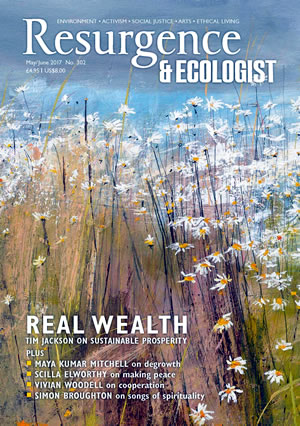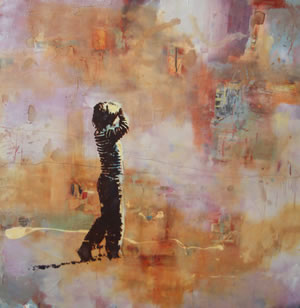While two boys struggled in raging flood waters in Australia in 2011, Jordan Rice, aged 13, begged their rescuers, “Take my brother first.” They rescued 10-year-old Blake, but Jordan drowned.
Jordan’s cry was like the late British MP Jo Cox’s call to her friends when she was fatally shot twice and stabbed 15 times by a political extremist who attacked her on a street in her Yorkshire constituency last year. She urged them not to try to help her, but to escape to safety. Such examples cause many to wonder, “How might I react if extreme life-death moments forced me to reveal my true self? With selfish demands for help, or with generous compassion for others?”
For centuries, experts have endorsed beliefs about original sin, recently morphed into “the selfish gene”. Are we innately amoral or pre-moral, if not immoral? The Quakers believe there is “that of God in everyone”, yet the Quaker Richard Stanley Peters, a leading philosopher of education writing into the 1980s, appeared to exclude children aged under seven from “everyone”.
Peters pondered how “barbarian” children “ruled perhaps by bizarre and formless wishes” and lacking “knowledge of right or wrong” might “overcome their passions and self-love” and learn to respect others. How, he wondered, can teachers “sustain and cultivate a crust of civilisation over the volcanic core of atavistic emotions” in the infants’ “twilight world”?
In this view of the origins of human morality, children must be taught and socialised into becoming moral persons. Gradually they must learn “right from wrong” and study to follow the rules, laws and habits set by religious and political leaders. The good child obeys the rules and does not ask rebellious questions. Independent ideas about morality are discouraged, as when schools enforce “zero tolerance” of any breaking of the unquestioned rules.
The tradition that morality is learned obedience risks seeing well-educated and successful people as more moral than disadvantaged ones. Yet there are countless people with little education but great kindness. However, in Immanuel Kant’s philosophy, kindness is not necessarily moral. A mother’s love for her children or her neighbours may count as self-rewarding self-interest, or unthinking emotional instinct. In contrast, Kant’s true moral altruism is a self-denying rational decision to do good to others at no personal gain. This echoes the earlier view, which separates morality from human nature, as if morality were an impersonal, hard, unrewarding, unnatural and somewhat alien but highly civilised and valued human duty.
Yet what kind of beings would we be if we did not instinctively want to do good and enjoy doing so? To reduce human nature to “authentic, amoral animal biology” in contrast to our “synthetic, acquired social and moral life” denies the intensely social and spiritual qualities in human nature that create moral societies and cultures.
Humans can no more exist outside morality than fish exist out of water. Attempts to sidestep questions of power and justice endorse moral indifference and relativism. They imply that suffering does not really exist or matter. They reorder the world into other moralities of prudence, profit, utility, rule-keeping or performance. We worry about what price our “social capital” will fetch. Then older virtues of human “kindness, courage, civility, loyalty, love, generosity and gratitude” are replaced with calculating self-interest and avarice, as Alvin Gouldner argues in his 1970 book The Coming Crisis of Western Sociology.
Hannah Arendt, Zygmunt Bauman and other writers saw great dangers in unquestioning moral obedience. They believed that the German Holocaust revealed three main human types who showed the extent of human good and evil: the cruel perpetrators, the bystanders, and the few brave protesters. Ordinary good people commit evil when they obey orders, transfer responsibility up the hierarchy, and fail to see victims as persons. Morality is then the rare courage to resist and protest against unjust and cruel majority views, in compassion and solidarity with oppressed people.
Instead of favouring obedience that assumes actions are evil if they are against the rules, Arendt and Bauman believed that rules should be made only if they prohibit actions that are evil. This transforms beliefs about good and evil, right and wrong, from the edicts of remote authorities and unquestioned traditions into our everyday challenging, questioning, living realities, our human nature and conscience, actions and relationships.
In his 2003 book Modernity and the Holocaust, Bauman asked: where do concepts of morality come from if they are all somehow imagined and invented? Who invents them, how and why? As mentioned earlier, the idea that morality must be imposed on primitive child savages implies that an alien morality works against human nature. Yet morality has direct meaning and urgency to us all. It protects the self and others when it is rooted in vulnerable, needy human nature, our interdependence and long, dependent childhood, when it promotes human flourishing and reduces suffering.
Morality can then be seen as authentic and integral to human nature, rather than synthetic or arbitrary. However, if morality is partly innate rather than wholly acquired, when do we begin to be moral agents? Bauman wondered if there might be “pre-social grounds of moral behaviour”. If so, he thought, we would need radical revision of ideas about “the origins of the sources of moral norms”. He did not pursue these ideas, which raise questions of what it means to be human, and when human moral life begins.
To enlarge morality beyond verbal thoughts into human activity can recognise moral awareness in the preverbal early months of life. Beyond words, morality inheres in emotions, relationships and actions, in which babies engage from birth. Nevertheless, to imagine that babies have any notion of justice or goodness seems unrealistic. And yet they clearly express moral emotions of pleasure in relationships, trust and love and, if harmed, fear and mistrust.
Paul Bloom at Yale University showed babies films of puppet-like geometric shapes acting well or badly in hindering or helping one another. He analysed microsecond videos of babies’ gaze and their responses of attention and surprise. He concluded that babies from the age of just three months judge the goodness and badness of others’ actions, and soon they show empathy and compassion. They try to soothe those in distress, and have a rudimentary sense of justice. In experiments, most six- and ten-month-old babies in the study reached for the ‘helper’ puppet over the ‘hinderer’ puppet.
Bloom and many others consider that human altruism has developed over millennia into an innate capacity. This is supported by Frans de Waal’s research on other moral mammals, on natural selection, and on our mutual needs for common survival. Offspring of supportive parents are more likely to survive.
Moral humans are not simply good. They consciously struggle with good and bad impulses. Bloom argues that through developing their innate reason, imagination and compassion, children develop their rudimentary morality. The six-month-old baby I observed who generously passed around a soggy nibbled biscuit she had enjoyed to share with her family faced a lifetime of learning and refining her morality. Yet older people are not necessarily more kind or moral than young children, who can be extremely loyal, generous and forgiving.
Like other complex pack and herd species we are intensely sociable, wanting to relate, share and communicate. We have the additional human capacity for self-conscious and imaginative guilt, regret and shame, unlike, as Darwin said, swallows, who are not haunted by remorse if they leave their fledglings and migrate in the autumn.
Instead of schools trying to teach children to learn right from wrong, deep knowledge they already have, schools could respect, draw on and nurture this innate human understanding and critical capacity for independent moral judgement. The judgement 13-year-old Jordan Rice fully understood.








